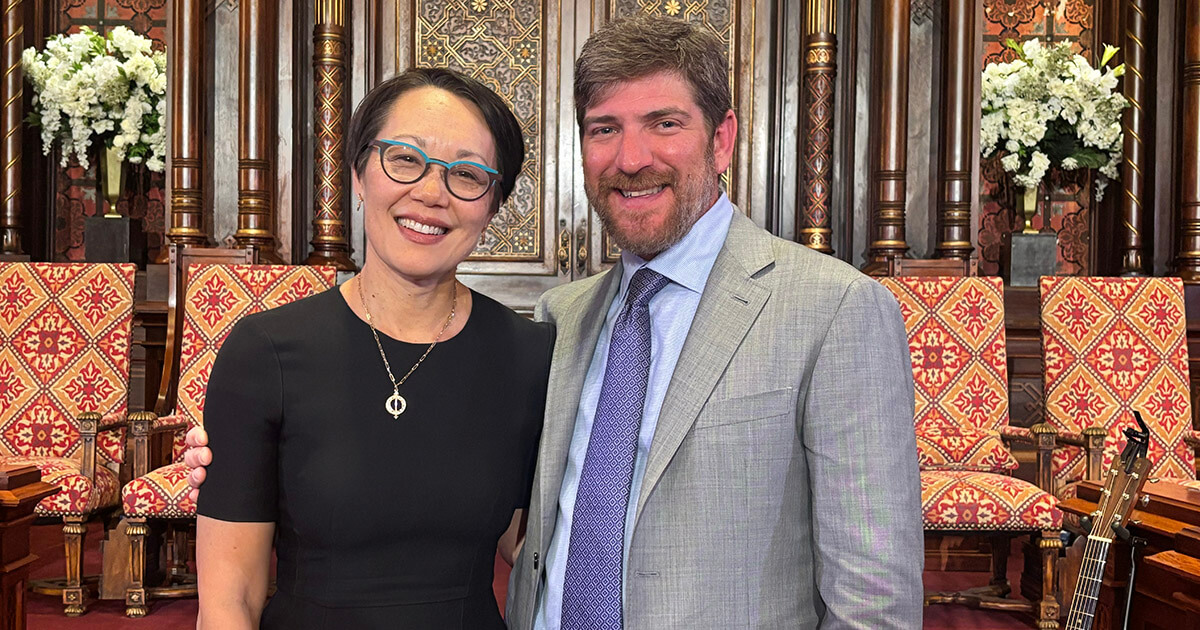Are ‘Goyim’ Really that Funny?

Image by Lily Padula
The Seesaw is a new kind of advice column in which a broad range of columnists will address the real life issues faced by interfaith couples and families. Join the discussion by commenting on this post, sharing it on Facebook or following the Forward on Twitter. And keep the questions coming. You can email your quandaries, which will remain anonymous, to: [email protected]
Are They Laughing At Me?
I am a non-Jewish, non-religious, decent guy who is engaged to a Jewish woman. I love her and her family. They are warm and funny and have accepted me completely. And I have accepted them and will go along with any Jewish anything my wife desires to bring into our family and home. But, yes, a but, I sometimes feel uneasy when their jokes become a little too insidery. Feels like everything is either “too goyishe” or “soooo Jewish.” Listen, I haven’t been living under a rock. I’ve seen “Curb Your Enthusiasm.” I get why and how these cultural differences can be funny. Still, they take it a little far and could be more considerate of the way it makes me feel like an outsider or the “other.” How do I bring this up with them?
I Know That Feeling

HALLOCK SVENSK: I know that feeling distinctly. Not necessarily in the context of my Jewish fiance (yes, I have one too!) and her family, though I have felt it with her occasionally. That feeling of a line being drawn and finding yourself, somehow, on the other side. Especially when you’re with somebody you love or when you’re joking around, the feeling can be a little disorienting, like: “Hey! I thought we were all in this together! I’m being (trying to be) accepting and open-minded and still lines are being drawn and now I feel a little less accepted myself.” If it feels like that, it never hurts to talk it through. Talk to your significant other after the fact (or before) and explain. Don’t let hurt feelings fester.
At the same time, there is no identity without some line-drawing and no relationships without some boundaries. Even, or especially, in love, there is no union without some irrevocable differences that will never go away, an otherness that is always there. Even if you were Jewish, had been born Jewish and could trace every generation of your family back to Abraham, you still might find yourself on the outside from time to time. While it can be frustrating if this feeling of otherness is based on stereotypes, fear or ignorance, part of acceptance means accepting that certain distances that will continue to exist between you and the people you love and that these in fact may be the very things that draw you to one another and keep you together.
Hallock Svensk grew up in New England and now lives in California. His fiance is Jewish and half-Chinese. They have a dog named Ace.
They’re Being Rude

DAN FRIEDMAN: Look Mr. Decent, you seem like a nice guy and no one wants to feel like an outsider, so I’ll tell you a secret. They’re being rude. Not Jewish rude, just rude. All families and groups have their own shtick to convey a sense of shared history — whether it’s jokes about bagels and the Holocaust for Jews, or hockey and, well, hockey for Canadians. But shticking it out there and excluding you, it’s just not hospitable.
Coming to the family dressed as Gandhi or Santa Claus isn’t going to be a funny reminder that they aren’t including you, but you can make a joke, ask some questions — you have standing.
And you should tell your special lady too, that you are feeling excluded from the clique and that she should remind her family, in private, that that their harmless racism isn’t. Odds are that she has some family stories that will make them seem a good deal less scary — Uncle Ed’s shady computer deals, Auntie Em’s lady “roommate” of 30 years’ standing, dad’s republican vote, the reason that cousins Lisa and Laura sit on opposite sides of the table is that one is a dyed-in-the wool bacon-eating atheist and the other is a New Agey vegan Buju and the whole family is sick of their “discussions.”
But when you raise the question with her, just be careful, we Jews get very defensive about criticism of our families!
Dan Friedman is the managing editor of the Forward.
Believe or Not, It’s a Sign of Acceptance

LAUREL SNYDER: Based on everything you’re saying here, you’re an easygoing, generous person, willing to accept and accommodate your new family. My instinct is to suggest that if you just let your wife-to-be know how you’re feeling, she’ll say something discretely to her folks, and you’ll see a genuine attempt at more inclusive language right away.
I doubt anyone means to exclude you. More likely, they’re trying to treat you like any other member of the family. The problem is that you’re not entirely like every other member of the family.
It’s a tricky thing in general, handling this kind of in-group banter. One the one hand, a minority culture derives a sense of identity from such talk. On the other hand… the language can get a little bit critical, and sometimes even racist. Honestly, words like shiksa and goyishe always make me uncomfortable. I used to work with a Jewish fraternity on a regular basis, and in that environment, it was especially troubling. Because those guys really did seem to think Jews were better than other people. I cringed whenever it happened around non-Jews.
Probably, you’ll end up meeting your in-laws halfway. Learning to laugh when things are “sooo Jewish.” And hearing less less about how things are “too goyishe.” Which is probably as it should be. Embracing one’s culture shouldn’t have to mean putting other people down.
Even when it gets a laugh.
Laurel Snyder is the author of books like “Bigger than a Bread Box” and “Baxter, the Pig Who Wanted To Be Kosher.” Find her online at laurelsnyder.com or on Twitter @laurelsnyder.














